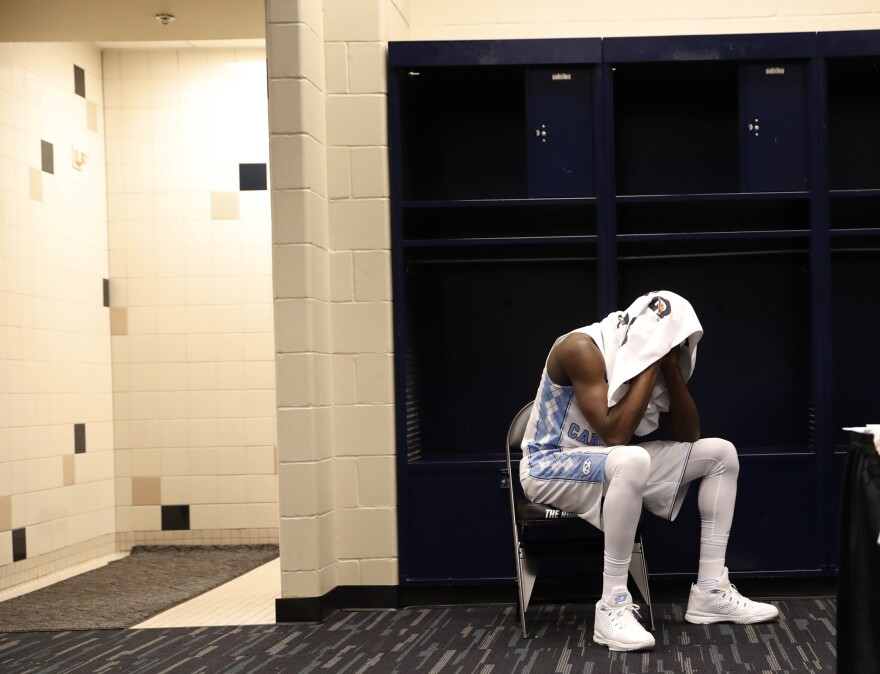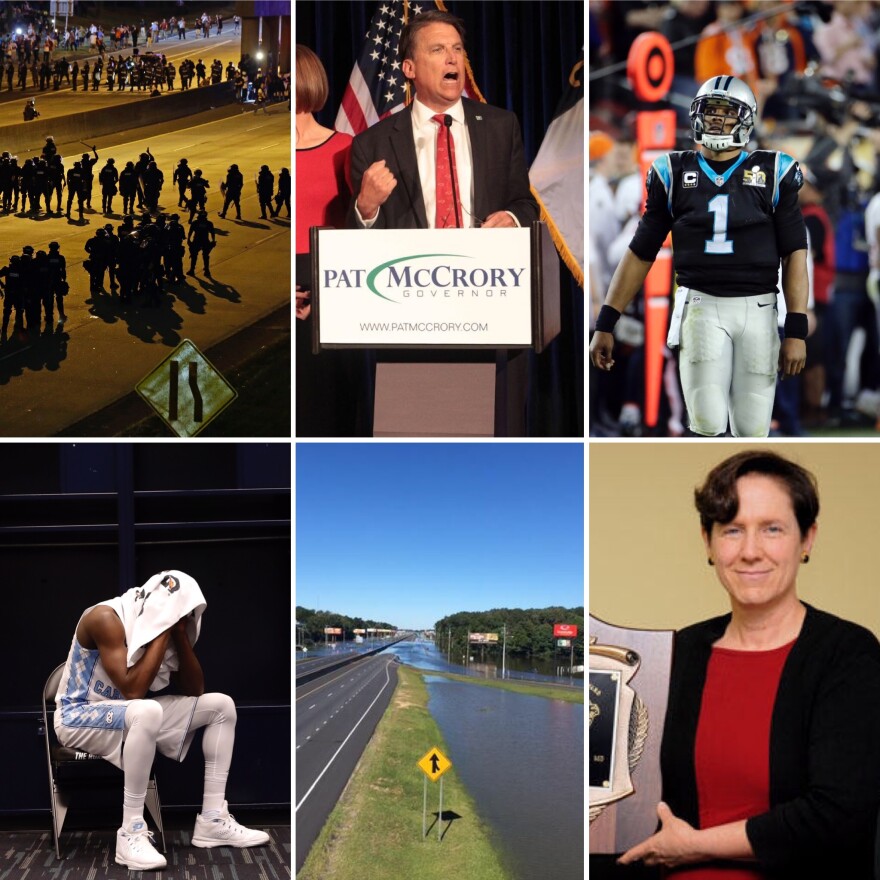From record flooding and major sporting losses, to the state’s prolonged gubernatorial election and the immigration detention of a Durham teen, North Carolina had its share of significant news stories in 2016.
In January, the Carolina Panthers lost the Super Bowl to the Denver Broncos. As Carolina Tight End Ed Dickson said after the game: “Hopefully we can channel this and come back and do great things, you know. We've been to the mountain; we just haven't reached over the top."
A couple of months later, the state Legislature passed the controversial House Bill 2 law, a measure with long-lasting political, social and economic fallout.
And in the fall, two major natural disasters, including record flooding after Hurricane Matthew and fast-moving wildfires in western North Carolina, cost the state billions of dollars.
Here’s a list, in chronological order, of the top stories of the year:

#1 Wildin Acosta detained, supporters rally for Durham teen

Wildin Acosta was detailed by Immigration and Customs Enforcement officers in January on his way to school at Riverside High in Durham.
Acosta had come to North Carolina when he was 17-years-old and was a well-loved student at his school, according to teachers and fellow students.
While he sat in a detention center in Georgia awaiting deportation to his native Honduras, activists, teachers and students raised money and pressured politicians to review his case.
He was released from detention in August and is seeking asylum.

#2 Panthers lose the Super Bowl

Despite a valiant effort, the Carolina Panthers fell to the Denver Broncos in the 2016 Super Bowl.
Panthers Quarterback Cam Newton's MVP season ended in disappointment. He lost two fumbles, threw an interception and failed to produce a touchdown for the only time this season.
Players acknowledged the disappointment but said they hoped to channel the loss and come back again for a win.
Broncos’ linebacker Von Miller was named Super Bowl MVP.
Following the trip to the Super Bowl, the Panthers have had a disappointing 6-9 season. Quarterback Cam Newton and linebacker Luke Kuechly have suffered significant injuries.

#3 State lawmakers pass the controversial House Bill 2 law

It was arguably the largest news story in North Carolina this year, sending ripples through the state’s LGBT community, as well as across the country.
In a one-day session on March 23, the North Carolina state legislature passed House Bill 2, a law that requires people to use public restrooms that correspond to the gender listed on their birth certificate and limits anti-discrimination protections for LGBT people. It was a reaction to the Charlotte City Council's passage of a non-discrimination ordinance that added protections for the LGBT community.
Despite support from some groups, the law became a national controversy and affected the state’s economy -- with plans for hundreds of new jobs abandoned, concerts canceled, and major sporting events relocated out of state. The fiscal damage is estimated to be in the hundreds of millions of dollars, according to multiple economists.
In late December, the Charlotte City Council repealed its non-discrimination ordinance, which prompted Governor Pat McCrory to call a special legislative session to consider repealing HB2, but legislators failed to come to an agreement.

#4 UNC loses the title game of the men’s basketball tournament

The University of North Carolina lost the National Championship in heartbreaking fashion in April.
The Villanova Wildcats defeated the Tar Heels 77-74. Carolina overcame a late double-digit deficit, but was defeated by a basket at the buzzer. Thousands of fans watched in the Dean Dome in Chapel Hill.
The Tar Heels have won five NCAA Championships, most recently in 2009.

#5 Voter ID law discriminatory, congressional gerrymandering and state legislative maps

In July, a federal appeals court found that the state’s voter identification law was enacted "with discriminatory intent" and had to be blocked.
A three-judge panel of the 4th Circuit Court of Appeals in Richmond issued an opinion that reversed a lower-court's ruling that had upheld the law. The 2013 rewrite to voting laws in North Carolina required photo identification to cast in-person ballots and made other changes.
The U.S. Justice Department, state NAACP, League of Women Voters and others sued the state, saying the restrictions violated the remaining provisions of the federal Voting Rights Act and the Constitution.
Governor Pat McCrory requested a stay in the law, but the U.S. Supreme Court deadlocked in a 4 to 4 vote.
With the court deadlocked, voters did not have to show an ID at polls on Election Day in November. The decision also meant that early voting in North Carolina reverted back to 17 days.
In February, state lawmakers met a deadline to complete a court-ordered rewrite of the state's congressional voting maps. They also postponed the congressional primary until June 7. A federal appellate court declared North Carolina's 1st and 12th Congressional Districts unconstitutional because they were gerrymandered on race. The court ordered legislators to redraw the districts within two weeks.
And in November, a three-judge panel of a federal court ordered the North Carolina legislature to redraw its district lines and hold a new election next year. The court found 28 of the state house and senate districts were unconstitutionally racially gerrymandered. The decision requires the redrawing of the lines and shortens all the terms of members elected earlier this month to one year.

#6 State epidemiologist resigns

State Epidemiologist Megan Davies resigned her position in August, saying she could not “work for a department and an administration that deliberately misleads the public."
The move was the latest twist in an ongoing dispute over coal ash contamination of home water wells and an inter-departmental fight within Governor Pat McCrory's administration.

#7 Charlotte police shooting

On September 20, a Charlotte-Mecklenburg Police officer fatally shot Keith Lamont Scott. Protests and riots erupted in Charlotte following the shooting.
Scott, a 43-year-old black man, was fatally shot by Charlotte Police Officer Brentley Vinson, who is also black.
On December 1, Mecklenburg County District Attorney Andrew Murray announced no charges will be brought against Vinson, saying the officer acted lawfully when he shot Scott.
Murray said Scott was armed with a loaded weapon when he exited his vehicle and did not comply with repeated commands by police to put the gun down.
Scott’s family has held that he was unarmed and reading a book, waiting on his son in the complex’s parking lot when he was approached by officers. But a previously unseen convenience store video taken just prior to the shooting shows a bulge around Scott’s leg.

#8 Hurricane Matthew pummels southeastern North Carolina

Hurricane Matthew pummeled North Carolina on October 8, but its real impact came days later when record amounts of rainfall and rising rivers inundated roads and homes across the state.
The storm brought down trees, knocked out power to hundreds of thousands of customers and killed more than two dozen people.
Multiple rivers crested at more than two dozen feet, and water triggered disastrous flooding in numerous towns, including Fayetteville, Greenville and Lumberton. The storm is estimated to have caused billions of dollars in damage.

#9 Wildfires ravage portions of western North Carolina

While eastern North Carolina recovered from record flooding, western portions of the state faced another natural threat: wildfires.
In November, numerous wildfires spread across portions of North Carolina and more than 1,000 people had to be evacuated. In all, more than 55,000 acres burned in western portions of the state. The fire also devastated portions of Georgia, South Carolina and Tennessee.
Gov. Pat McCrory held a special session on December 13 to authorize financial assistance for wildfire and Hurricane Matthew recovery. Dubbed the “Disaster Recovery Act”, the bill allocates more than $200 million, mostly for the State Emergency Response and Disaster Relief fund and to match a congressional distribution.

#10 Gubernatorial race between Pat McCrory and Roy Cooper

North Carolinians cast more than 4.7 million votes in the November gubernatorial race, but less than one percent separated incumbent Pat McCrory and his challenger Roy Cooper.
Cooper's margin of victory doubled to more than 10,000 votes after Election Night. But it took McCrory 28 days to concede he had lost the election to his challenger. He did so in December via a YouTube message.
Before McCrory conceded, his campaign helped file complaints alleging voter fraud in dozens of counties. Almost all were dismissed for lack of evidence.



